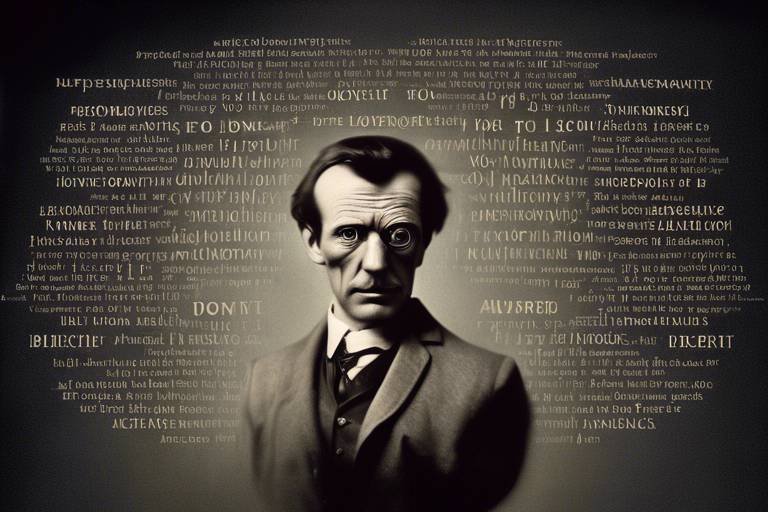The Relationship between Ontology and Epistemology
This article explores the intricate connection between ontology and epistemology, examining how our understanding of existence influences our knowledge acquisition and vice versa. It delves into their definitions, implications, and significance in philosophy.
Ontology is the philosophical study of being and existence. It addresses questions about what entities exist and how they can be categorized. Understanding ontology is crucial for grasping the foundational aspects of reality. Think of ontology as the framework that lays the groundwork for everything we perceive. It asks the big questions: What is real? What does it mean for something to exist? By categorizing entities, ontology helps us make sense of the world around us. For instance, consider the difference between physical objects like trees and abstract concepts like justice. Ontology helps us navigate these distinctions, allowing us to define our reality more clearly.
Epistemology is the study of knowledge—its nature, sources, and limits. It investigates how we know what we know and the justification of beliefs, playing a vital role in philosophical inquiry. Imagine epistemology as the lens through which we view our understanding of reality. It challenges us to consider the origins of our beliefs and the validity of our knowledge. Questions like "How do I know this?" or "What justifies my belief?" are central to epistemological discussions. By exploring the sources of knowledge, whether they be sensory experiences, reasoning, or testimony, epistemology helps us evaluate the credibility of what we accept as true.
The relationship between ontology and epistemology reveals how our beliefs about existence shape our understanding of knowledge. This interplay is essential for constructing coherent philosophical frameworks. For instance, if one adopts a materialist ontology, believing that only physical entities exist, their epistemological stance may lean towards empiricism, emphasizing observation and experience as the primary sources of knowledge. Conversely, if one believes in a more abstract ontology, such as idealism, they might prioritize introspective or rationalist approaches to knowledge acquisition. This dynamic creates a rich tapestry of philosophical thought where ontology and epistemology continually influence each other.
Ontology significantly impacts epistemology by determining what is considered knowable. Different ontological views lead to varying epistemological approaches, affecting how knowledge is perceived and validated. For example, in a framework where only tangible objects are acknowledged, knowledge must be derived from observable phenomena. In contrast, an ontology that includes abstract entities allows for knowledge derived from theoretical constructs and abstract reasoning. This influence is crucial; it shapes the methodologies we employ in our pursuit of knowledge and the criteria we use to validate it.
Conversely, epistemological perspectives can shape ontological assumptions. How we acquire knowledge may influence what we believe exists, leading to different interpretations of reality. If we prioritize empirical evidence as the basis for knowledge, we may become skeptical of entities that cannot be observed or measured, such as emotions or moral truths. This reciprocal relationship means that our understanding of knowledge can lead us to redefine what we consider real. By examining the ways in which knowledge shapes our beliefs about existence, we can gain deeper insights into both our epistemological and ontological frameworks.
Historically, philosophers have debated the relationship between ontology and epistemology. Understanding these perspectives provides insight into how philosophical thought has evolved regarding existence and knowledge. From ancient philosophers like Plato, who distinguished between the world of forms and the material world, to modern thinkers like Kant, who proposed that our understanding of reality is shaped by our cognitive frameworks, these discussions have significantly influenced contemporary philosophy. Each era has added layers to our understanding, showing that the relationship between ontology and epistemology is not static but rather a dynamic dialogue that continues to evolve.
In modern philosophy, the relationship between ontology and epistemology remains highly relevant. Contemporary debates often revolve around issues such as realism, constructivism, and the nature of truth. For instance, in the realm of science, ontological discussions about what constitutes a scientific entity can influence epistemological questions about how we can know and understand those entities. The rise of postmodern thought has further complicated these discussions, challenging traditional notions of truth and existence. As we navigate these complexities, the interplay between ontology and epistemology continues to shape our understanding of the world.
The interplay between ontology and epistemology has significant implications in fields like science and technology. Understanding these concepts can enhance critical thinking and inform methodologies in various disciplines. For example, in artificial intelligence, ontological frameworks help define what entities AI should recognize and interact with, while epistemological considerations inform how AI systems learn and adapt. This relationship is not just theoretical; it has practical applications that can lead to innovations and advancements in various sectors.
The relationship also extends to ethics and morality, influencing how we understand moral truths and responsibilities. Exploring this connection can lead to deeper insights into ethical theories and practices. For instance, if one adopts an ontological view that sees moral truths as objective and universal, their epistemological approach may focus on discovering these truths through rational discourse. Conversely, if one believes that moral truths are socially constructed, their epistemological stance may emphasize understanding diverse perspectives and contexts. This interplay is crucial for developing a comprehensive ethical framework that can address the complexities of human behavior and societal norms.
- What is the main difference between ontology and epistemology?
Ontology focuses on the nature of being and existence, while epistemology deals with the nature and limits of knowledge.
- How do ontology and epistemology influence each other?
Ontology shapes what is considered knowable, while epistemology influences beliefs about what exists.
- Why is the relationship between ontology and epistemology important?
This relationship is essential for constructing coherent philosophical frameworks and understanding the complexities of knowledge and existence.

Defining Ontology
Ontology, at its core, is the philosophical study of being and existence. It dives deep into the fundamental questions of what entities exist in our universe and how these entities can be categorized. Imagine walking into a vast library where every book represents a different entity in existence. Some books are thick and complex, detailing the intricate nature of abstract concepts like justice or love, while others are thin and straightforward, discussing tangible objects like trees or rocks. This library is akin to the ontological landscape, where philosophers categorize and analyze the myriad forms of existence.
Understanding ontology is crucial for grasping the foundational aspects of reality. It allows us to explore various categories of being, such as physical objects, abstract concepts, and even imaginary entities. In this regard, ontology can be likened to the framework of a house; without a solid structure, the house cannot stand. Similarly, without a clear understanding of what exists, our comprehension of knowledge and reality becomes shaky.
Ontology raises several essential questions, such as:
- What is the nature of existence?
- How do we categorize different types of entities?
- Are abstract concepts like numbers and ideas as real as physical objects?
These questions not only provoke thought but also lay the groundwork for further philosophical exploration. The implications of ontological theories ripple through various fields, influencing everything from science to ethics. For instance, a realist ontological perspective posits that objects exist independently of our perception, while a constructivist view suggests that our understanding of existence is shaped by social constructs and individual experiences.
In essence, ontology is not just an abstract concept confined to the realm of philosophy; it has practical implications that affect how we perceive and interact with the world around us. By understanding the nuances of ontology, we can better navigate the complexities of existence and knowledge, ultimately leading to a richer understanding of our reality.

Defining Epistemology
Epistemology, at its core, is the philosophical study of knowledge. It digs deep into the **nature**, **sources**, and **limits** of what we know. Imagine it as the lens through which we examine the vast landscape of understanding. Just like a detective piecing together clues, epistemology seeks to uncover how we acquire knowledge and what justifies our beliefs. It raises intriguing questions such as: What does it mean to know something? Is knowledge merely a collection of facts, or does it encompass a deeper understanding of truths?
To grasp epistemology fully, we must explore its key components. First, it addresses the **sources of knowledge**. These can range from sensory experiences to intuition, reason, and even testimony from others. Each source offers a unique way of knowing, much like different paths leading to the same destination. For instance, consider how we learn about the world around us: we touch, see, hear, and even read. Each of these methods contributes to our overall understanding.
Next, epistemology delves into the **justification of beliefs**. This aspect is crucial because not all beliefs are created equal. Just because we believe something to be true doesn't necessarily make it so. Think of it this way: if you believe in a fairy tale, that belief might bring you joy, but it doesn’t hold up under scrutiny. Thus, epistemologists ask: what criteria must a belief meet to be considered knowledge? This leads to various theories of knowledge, including **empiricism**, which emphasizes experience, and **rationalism**, which values reason.
Moreover, epistemology examines the **limits of knowledge**. Are there things that are inherently unknowable? This question can be quite unsettling. For example, consider the mysteries of the universe or the complexities of human consciousness. Just as a vast ocean might hide treasures beneath its surface, some truths may remain elusive, no matter how hard we search. This exploration of limits encourages humility in our quest for understanding, reminding us that some questions may never be answered.
In summary, epistemology is a profound field that shapes our understanding of knowledge. It challenges us to think critically about how we come to know what we know and the foundations upon which our beliefs rest. By exploring the sources, justifications, and limits of knowledge, we not only enrich our philosophical inquiry but also enhance our everyday decision-making. So, the next time you ponder a belief or claim, consider the epistemological questions behind it—after all, knowledge is a powerful tool, but it requires careful consideration to wield effectively.
- What is the difference between ontology and epistemology?
Ontology focuses on the nature of being and existence, while epistemology studies the nature and limits of knowledge. - Why is epistemology important?
It helps us understand how we acquire knowledge and the justification of our beliefs, which is essential for critical thinking. - Can knowledge be absolute?
This is a debated topic in epistemology, with many arguing that knowledge is often provisional and subject to change.

The Interplay between Ontology and Epistemology
The relationship between ontology and epistemology is not merely a philosophical curiosity; it is a dynamic interplay that shapes our understanding of existence and knowledge. Imagine ontology as the foundation of a house, where the walls represent the various entities and categories that exist in our reality. Meanwhile, epistemology serves as the windows and doors, allowing us to perceive, understand, and interact with those entities. This metaphor illustrates how our beliefs about what exists influence our methods of acquiring knowledge. Without a solid ontological foundation, our epistemological pursuits could easily crumble, much like a house built on sand.
At the core of this interplay lies the question: how do our assumptions about existence affect what we consider to be knowable? For instance, if one holds a materialist ontology, which posits that only physical entities exist, their epistemological approach will likely focus on empirical evidence and scientific methods. Conversely, someone who subscribes to a dualistic ontology, which recognizes both physical and non-physical entities, might explore knowledge through a combination of scientific inquiry and subjective experience. This divergence illustrates how different ontological perspectives can lead to contrasting epistemological frameworks.
Moreover, the influence flows in both directions. Our epistemological beliefs—how we justify our knowledge—can shape our ontological assumptions. For example, if a person believes that knowledge is primarily constructed through social interactions (a constructivist epistemology), they may come to view reality as a product of social consensus rather than an objective existence. This shift can lead to a more fluid understanding of what entities exist, challenging traditional notions of reality.
To illustrate this interplay further, consider the following table that summarizes key differences between ontology and epistemology:
| Aspect | Ontology | Epistemology |
|---|---|---|
| Definition | Study of being and existence | Study of knowledge and belief |
| Focus | What exists? | How do we know what exists? |
| Influence | Shapes what is considered knowable | Shapes beliefs about existence |
This table encapsulates the essence of how ontology and epistemology are intertwined. The implications of their relationship extend beyond philosophy, influencing fields such as science, technology, and even ethics. By understanding this interplay, we gain a more nuanced perspective on the world around us, enhancing our critical thinking skills and enriching our philosophical inquiries.
In conclusion, the interplay between ontology and epistemology is a fascinating dance that reveals the complexity of human understanding. Just as a skilled dancer adjusts their movements based on the rhythm of the music, our philosophical frameworks must adapt in response to our beliefs about existence and knowledge. This continual adjustment not only enriches our intellectual pursuits but also deepens our appreciation for the intricate tapestry of reality.
- What is the difference between ontology and epistemology? Ontology focuses on the nature of being and existence, while epistemology deals with the nature and limits of knowledge.
- How do ontology and epistemology influence each other? Ontological beliefs shape what we consider knowable, while epistemological perspectives can alter our assumptions about what exists.
- Why is the relationship between ontology and epistemology important? Understanding their interplay enhances our critical thinking and provides a framework for exploring complex philosophical questions.

Ontology's Influence on Knowledge
Ontology plays a pivotal role in shaping our understanding of knowledge. When we delve into the realm of ontology, we are essentially asking, "What exists?" This question is not just philosophical mumbo jumbo; it has real implications for how we acquire and validate knowledge. Imagine ontology as the foundation of a house. If the foundation is shaky or poorly constructed, the entire structure—our understanding of knowledge—will be unstable. Thus, the way we categorize and interpret existence directly impacts our epistemological approaches.
Different ontological views lead to varying epistemological frameworks. For instance, if one subscribes to a materialistic ontology, they may argue that only physical entities are knowable. This perspective limits the scope of knowledge to what can be observed and measured, thereby dismissing abstract concepts like emotions or ethical values as subjective or unworthy of serious consideration. Conversely, an idealist ontological perspective posits that reality is fundamentally mental or spiritual, allowing for a broader interpretation of knowledge that includes subjective experiences and inner states.
Moreover, ontology influences knowledge acquisition by dictating what is deemed worthy of investigation. For example, in the realm of science, a realist ontology supports the idea that there are objective truths waiting to be discovered. This belief drives scientists to pursue empirical evidence and objective measurements. On the flip side, a constructivist ontology suggests that knowledge is constructed through social processes and interactions, leading to a different approach in research methodologies. Here, knowledge is viewed as a product of cultural and contextual factors, which can vary significantly from one society to another.
To further illustrate this influence, consider the following table that summarizes different ontological perspectives and their implications for knowledge:
| Ontological Perspective | Implications for Knowledge |
|---|---|
| Materialism | Limits knowledge to observable, physical entities; subjective experiences are often dismissed. |
| Idealism | Allows for a broader understanding of knowledge, including subjective and abstract concepts. |
| Realism | Supports the pursuit of objective truths, driving empirical research and scientific inquiry. |
| Constructivism | Views knowledge as socially constructed, emphasizing the role of culture and context in understanding. |
In summary, ontology does not merely sit in the background; it actively shapes our epistemological pursuits. The interplay between what we believe exists and how we come to know it creates a dynamic landscape of understanding. By recognizing this influence, we can better appreciate the complexities of knowledge and the philosophical underpinnings that guide our inquiries. So, next time you ponder a question of knowledge, take a moment to consider the ontological assumptions that might be lurking in the background!
- What is the main difference between ontology and epistemology?
Ontology focuses on the nature of being and existence, while epistemology deals with the nature and scope of knowledge. - How does ontology affect scientific research?
Ontology influences what is considered knowable in science, shaping research methodologies and approaches to evidence. - Can you give an example of how different ontological views impact knowledge?
Yes! A materialist view limits knowledge to the physical realm, while an idealist view allows for knowledge of abstract concepts, such as emotions. - Why is it important to understand the relationship between ontology and epistemology?
Understanding this relationship helps us construct coherent philosophical frameworks and enhances our critical thinking skills.

Epistemology's Influence on Ontology
When we dive into the relationship between epistemology and ontology, it becomes clear that the way we acquire knowledge can significantly shape our beliefs about what exists. Imagine for a moment that our understanding of reality is like a vast landscape. The paths we choose to traverse—those paths representing our methods of gaining knowledge—directly influence the terrain we encounter. If we approach knowledge with a strict scientific lens, for instance, we might only acknowledge entities that can be empirically verified, thereby limiting our ontological views to a more materialistic perspective.
This influence is not merely academic; it has real-world implications. Consider how different epistemological frameworks can lead to varying ontological conclusions. For example, a constructivist epistemology posits that knowledge is constructed through social processes and interactions. This perspective might lead one to believe that reality is not a fixed entity but rather a construct shaped by human experiences and perceptions. Thus, the relationship between these two branches of philosophy is a dynamic interplay where knowledge acquisition can redefine our understanding of existence itself.
Furthermore, the implications of this influence extend into areas such as science, ethics, and even technology. For instance, in scientific inquiry, if we adopt a positivist epistemology, we may conclude that only observable phenomena exist, which can lead to the exclusion of subjective experiences from our ontological framework. Conversely, if we embrace a more interpretivist approach, we might argue that subjective experiences are just as real as physical entities, thereby broadening our ontological horizons.
In essence, the dance between epistemology and ontology is a continuous one. Our methods of knowing not only shape what we believe exists but also challenge us to reconsider the very foundations of our reality. This interplay encourages a deeper exploration of both disciplines, prompting us to ask critical questions about the nature of knowledge and existence. Are we merely passive recipients of knowledge, or do we actively create our realities through our understanding? The answers to these questions can profoundly influence our philosophical outlook and our approach to the world around us.
- What is the primary difference between ontology and epistemology?
Ontology focuses on the nature of being and existence, while epistemology deals with the nature and scope of knowledge. - How does epistemology affect scientific research?
Different epistemological perspectives can influence the methodologies and interpretations of scientific findings. - Can ontology change based on new knowledge?
Yes, as our understanding of knowledge evolves, so too can our ontological beliefs about what exists.

Historical Perspectives
The relationship between ontology and epistemology has been a topic of rich debate throughout the history of philosophy. From the ancient Greeks to contemporary thinkers, the interplay between what exists and how we know it has shaped various philosophical movements. In ancient philosophy, figures like Plato and Aristotle laid the groundwork for these discussions. Plato, with his theory of Forms, suggested that the physical world is merely a shadow of a higher reality, thus influencing how knowledge is perceived. For him, knowledge was about grasping these eternal truths rather than the transient objects of the material world.
Aristotle, on the other hand, grounded his ontology in the observable world. He emphasized the importance of empirical evidence and categorization of beings, which shifted the focus towards a more systematic approach to understanding existence. This tension between Plato's idealism and Aristotle's realism has echoed through the ages, influencing countless philosophers who followed.
During the Middle Ages, the relationship between ontology and epistemology became intertwined with theology. Thinkers like Thomas Aquinas sought to reconcile Aristotelian philosophy with Christian doctrine, arguing that knowledge could be derived from both reason and divine revelation. This synthesis led to a more complex understanding of existence, where both faith and reason played critical roles in shaping knowledge.
Moving into the Modern Era, philosophers like René Descartes and Immanuel Kant further explored the relationship. Descartes famously declared, "I think, therefore I am," emphasizing the role of the self in understanding existence. His epistemology hinged on doubt and certainty, leading to a new way of thinking about knowledge as something that must be established through rigorous reasoning.
Kant, meanwhile, proposed a revolutionary idea that our understanding of the world is shaped by the structures of our mind. He argued that while there is a reality independent of our perceptions (noumena), we can only know the world as it appears to us (phenomena). This distinction highlights a crucial point in the ontology-epistemology relationship: our knowledge is limited by our cognitive faculties, which in turn informs our beliefs about what exists.
In the 20th century, the debate shifted again with the rise of existentialism and postmodernism. Philosophers like Martin Heidegger and Michel Foucault challenged traditional notions of being and knowledge, arguing that existence is not a static concept but rather fluid and context-dependent. They posited that our understanding of reality is deeply influenced by cultural, historical, and social factors, thus complicating the ontology-epistemology relationship even further.
Today, the historical perspectives on ontology and epistemology remind us that our understanding of existence and knowledge is not just an abstract exercise but is deeply rooted in our experiences and the evolution of human thought. As we navigate contemporary philosophical discussions, these historical insights provide a valuable framework for examining how our beliefs shape our understanding of reality and vice versa.
- What is the difference between ontology and epistemology? Ontology deals with the nature of being and existence, while epistemology focuses on the nature and limits of knowledge.
- How do ontology and epistemology influence each other? Our beliefs about what exists (ontology) shape how we acquire and validate knowledge (epistemology), and vice versa.
- Why is the historical perspective important? Understanding the historical context of these concepts helps us appreciate their evolution and relevance in contemporary philosophical debates.

Contemporary Relevance
In today's fast-paced world, the relationship between ontology and epistemology is more relevant than ever. As we navigate through the complexities of modern life, our understanding of what exists and how we come to know it shapes not only our philosophical inquiries but also our everyday decisions. Think about it: every time we make a choice based on our beliefs about reality, we are engaging in a dance between these two fundamental branches of philosophy. This interplay is crucial, especially in a time when technology and science challenge our traditional notions of existence and knowledge.
For instance, consider the rise of artificial intelligence (AI). The ontological question here is: what is AI? Is it merely a tool, or does it possess some form of existence that demands ethical consideration? This leads us to epistemological inquiries about how we understand and justify our knowledge of AI's capabilities and limitations. Are we truly knowledgeable about the implications of AI in our lives, or are we operating under assumptions that may not hold true in the long run? These questions underline the importance of intertwining ontology and epistemology in contemporary discussions.
Furthermore, the realms of realism and constructivism illustrate the ongoing debate between these two philosophical domains. Realists argue that there is a reality independent of our perceptions, while constructivists contend that our understanding of reality is shaped by social processes and experiences. This dichotomy not only influences academic discourse but also impacts practical fields such as education, where differing ontological and epistemological views can lead to varied teaching methodologies. For example:
| Ontology Perspective | Epistemology Approach | Implications in Education |
|---|---|---|
| Realism | Empiricism | Focus on objective knowledge and standardized testing |
| Constructivism | Interpretivism | Emphasis on experiential learning and critical thinking |
Moreover, the implications of ontology and epistemology extend beyond academia and into the realms of ethics and morality. In a world where moral dilemmas arise daily, our understanding of existence influences our ethical frameworks. For example, if one believes in a fixed moral truth (an ontological stance), it shapes the epistemological approach of seeking objective justifications for actions. Conversely, a more relativistic view of morality might lead to a more subjective understanding of knowledge, where beliefs are seen as personal constructs rather than universal truths.
In summary, the contemporary relevance of ontology and epistemology cannot be overstated. As we grapple with the challenges of our time—be it through technology, education, or ethical considerations—the dialogue between what exists and how we know it continues to evolve. This ongoing conversation not only enriches philosophical inquiry but also enhances our ability to navigate the complexities of modern life with greater awareness and understanding.
- What is the difference between ontology and epistemology? Ontology deals with the nature of being and existence, while epistemology focuses on the nature and scope of knowledge.
- Why is the relationship between ontology and epistemology important? Understanding their relationship helps us construct coherent philosophical frameworks and informs our approach to knowledge and existence.
- How do ontology and epistemology apply to modern technology? They influence how we perceive and interact with technologies like AI, shaping our understanding of their existence and implications.

Applications in Science and Technology
In the fast-paced world of science and technology, the relationship between ontology and epistemology plays a crucial role in shaping how we understand and interact with the universe. Imagine a scientist embarking on a journey to uncover the secrets of the cosmos; their ontological beliefs about what constitutes reality—whether they lean towards a materialistic view or embrace a more abstract interpretation—will directly influence their epistemological approach. This interplay is not just theoretical; it has practical implications that ripple through various fields.
For instance, in artificial intelligence (AI), understanding what constitutes a "thing" or "entity" is fundamental. If we consider an AI to be a sentient being with its own existence, our approach to programming and interaction changes dramatically. On the other hand, if we view AI merely as a tool, our focus shifts towards optimizing algorithms and data processing. This ontological stance directly influences how we gather knowledge about AI's capabilities, limitations, and ethical implications.
Moreover, in the realm of biotechnology, the ontological question of what defines "life" can lead to vastly different epistemological frameworks. Are we merely manipulating biological entities, or are we creating new forms of life? This question not only impacts research methodologies but also influences regulatory policies and public perception. The debates surrounding genetic engineering, for example, are deeply rooted in our understanding of existence and knowledge, as they challenge traditional boundaries of what it means to live.
Furthermore, the field of quantum physics exemplifies the intricate dance between ontology and epistemology. The nature of particles, wave functions, and their behaviors leads to various interpretations, such as the Copenhagen interpretation versus many-worlds theory. Each of these perspectives offers different insights into what we can know about the universe, showcasing how our beliefs about existence can shape our scientific inquiries and vice versa.
In a more practical context, consider the development of software systems. The ontology of data—how we categorize and understand information—determines how effectively we can acquire knowledge through data analysis. A well-defined ontology can lead to improved data interoperability and better decision-making processes. This is especially relevant in fields such as big data analytics and machine learning, where the quality of knowledge derived from data hinges on our foundational understanding of the data itself.
In summary, the applications of ontology and epistemology in science and technology are vast and varied. They not only influence theoretical frameworks but also shape practical methodologies and ethical considerations. By understanding these concepts, professionals in these fields can enhance their critical thinking and develop more robust approaches to problem-solving.
- What is the significance of ontology in scientific research? Ontology helps define what entities exist in a given domain, guiding researchers in their inquiries and methodologies.
- How does epistemology influence technological development? Epistemology shapes our understanding of knowledge acquisition, affecting how technologies are developed and implemented.
- Can ontology and epistemology impact ethical decision-making? Yes, our beliefs about existence and knowledge can influence our moral frameworks and responsibilities in various fields.

Implications for Ethics and Morality
The relationship between ontology and epistemology profoundly influences our understanding of ethics and morality. At its core, ontology deals with the nature of being and existence, which directly informs our beliefs about what constitutes moral values and ethical principles. For instance, if we adopt an ontological perspective that views humans as inherently rational beings, this can lead to a moral framework that emphasizes reason and logic as the basis for ethical decision-making. On the other hand, if we perceive existence through a lens that prioritizes emotional or communal experiences, our ethical considerations might lean more towards empathy and social harmony.
Moreover, epistemology, the study of knowledge, plays a crucial role in how we justify our moral beliefs. Understanding how we acquire knowledge about right and wrong shapes our ethical frameworks. For example, if we believe that moral truths are discovered through reasoned argument and empirical evidence, we may adopt a more utilitarian approach to ethics, where the consequences of actions are evaluated based on their outcomes. Conversely, if we view moral knowledge as something that is socially constructed or culturally relative, it can lead to a more relativistic perspective, where different societies may have divergent moral codes that are equally valid.
This interplay between ontology and epistemology can also be observed in the development of ethical theories. Consider the following table that illustrates some prominent ethical theories and their ontological and epistemological underpinnings:
| Ethical Theory | Ontological Perspective | Epistemological Perspective |
|---|---|---|
| Utilitarianism | Consequentialism: Focus on outcomes | Empirical: Knowledge through observation |
| Deontology | Duty-based: Inherent moral duties | Rationalism: Knowledge through reason |
| Virtue Ethics | Character-based: Focus on moral character | Intuitionism: Knowledge through moral intuition |
| Relativism | Social Constructivism: Morals shaped by society | Contextual: Knowledge varies by context |
As we analyze these ethical theories, we can see how the foundational beliefs about existence and knowledge shape our moral landscapes. This relationship is not just academic; it has real-world implications. For instance, in debates about human rights, differing ontological views on the nature of humanity can lead to vastly different conclusions about what rights are inherent to all people. Similarly, epistemological disagreements about how we come to know moral truths can result in conflicts over ethical standards in various societies.
Ultimately, exploring the implications of ontology and epistemology on ethics and morality allows us to engage more deeply with the questions that define our human experience. It challenges us to reflect on our own beliefs and the foundations upon which they are built. By understanding this relationship, we become better equipped to navigate the complexities of moral dilemmas and contribute to meaningful discussions about ethics in our increasingly interconnected world.
- What is the difference between ontology and epistemology?
Ontology is the study of being and existence, while epistemology focuses on the nature and limits of knowledge. - How do ontology and epistemology impact ethical theories?
They shape our understanding of what is morally right or wrong and influence how we justify our ethical beliefs. - Can ontology and epistemology lead to conflicting moral views?
Yes, differing perspectives on existence and knowledge can result in varied and sometimes conflicting ethical frameworks. - Why is it important to understand the relationship between ontology and epistemology?
Understanding this relationship helps us navigate complex moral issues and enhances critical thinking in ethical discussions.
Frequently Asked Questions
- What is ontology?
Ontology is the philosophical study of being and existence. It focuses on questions about what entities exist, how they can be categorized, and the nature of those entities. Understanding ontology is crucial for grasping the foundational aspects of reality.
- What is epistemology?
Epistemology is the study of knowledge, including its nature, sources, and limits. It investigates how we know what we know, the justification of beliefs, and plays a vital role in philosophical inquiry. Essentially, it’s about understanding the process of knowledge acquisition.
- How do ontology and epistemology interact?
The relationship between ontology and epistemology reveals how our beliefs about existence shape our understanding of knowledge. This interplay is essential for constructing coherent philosophical frameworks, as different ontological views can lead to varying epistemological approaches.
- Can ontology influence knowledge?
Absolutely! Ontology significantly impacts epistemology by determining what is considered knowable. Different ontological perspectives can lead to different interpretations of reality, affecting how knowledge is perceived and validated.
- Does epistemology affect ontology?
Yes, it does! Epistemological perspectives can shape ontological assumptions. How we acquire knowledge influences what we believe exists, leading to different interpretations of reality and existence.
- Why is the relationship between ontology and epistemology historically significant?
Historically, philosophers have debated the relationship between these two fields, providing insight into how philosophical thought has evolved. Understanding these historical perspectives helps us appreciate the depth of inquiry into existence and knowledge.
- What is the contemporary relevance of ontology and epistemology?
In modern philosophy, the relationship between ontology and epistemology remains highly relevant. Contemporary debates often revolve around issues such as realism, constructivism, and the nature of truth, influencing various academic disciplines.
- How do ontology and epistemology apply to science and technology?
The interplay between ontology and epistemology has significant implications in fields like science and technology. Understanding these concepts can enhance critical thinking and inform methodologies, thereby improving research and innovation.
- What are the implications of ontology and epistemology for ethics?
The relationship extends to ethics and morality, influencing how we understand moral truths and responsibilities. Exploring this connection can lead to deeper insights into ethical theories and practices, impacting how we approach moral dilemmas.



















